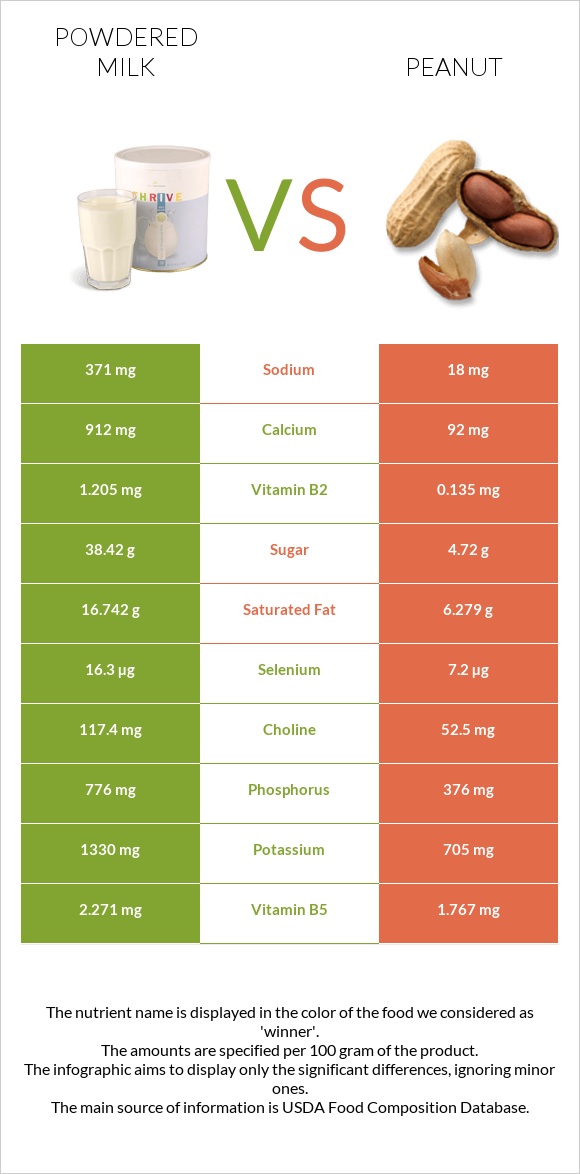Powdered milk vs. Peanut — In-Depth Nutrition Comparison
Compare
How are powdered milk and peanuts different?
- Powdered milk is higher in vitamin B12, vitamin B2, calcium, and phosphorus; however, peanuts are richer in copper, manganese, vitamin B3, vitamin E, and iron.
- Daily need coverage for vitamin B12 for powdered milk is 135% higher.
- Powdered milk contains 10 times more calcium than peanuts. While powdered milk contains 912mg of calcium, peanuts contain only 92mg.
- Peanuts have less saturated fat.
- Peanuts have a lower glycemic index (13) than powdered milk (32).
Milk, dry, whole, without added vitamin D and Peanuts, all types, raw are the varieties used in this article.
Infographic

Infographic link
Mineral Comparison
Mineral comparison score is based on the number of minerals by which one or the other food is richer. The "coverage" charts below show how much of the daily needs can be covered by 300 grams of the food.
| Contains more CalciumCalcium | +891.3% |
| Contains more PotassiumPotassium | +88.7% |
| Contains more PhosphorusPhosphorus | +106.4% |
| Contains more SeleniumSelenium | +126.4% |
| Contains more MagnesiumMagnesium | +97.6% |
| Contains more IronIron | +874.5% |
| Contains more CopperCopper | +1330% |
| Contains less SodiumSodium | -95.1% |
| Contains more ManganeseManganese | +4735% |
Vitamin Comparison
Vitamin comparison score is based on the number of vitamins by which one or the other food is richer. The "coverage" charts below show how much of the daily needs can be covered by 300 grams of the food.
| Contains more Vitamin CVitamin C | +∞% |
| Contains more Vitamin AVitamin A | +∞% |
| Contains more Vitamin DVitamin D | +∞% |
| Contains more Vitamin B2Vitamin B2 | +792.6% |
| Contains more Vitamin B5Vitamin B5 | +28.5% |
| Contains more Vitamin B12Vitamin B12 | +∞% |
| Contains more Vitamin KVitamin K | +∞% |
| Contains more Vitamin EVitamin E | +1336.2% |
| Contains more Vitamin B1Vitamin B1 | +126.1% |
| Contains more Vitamin B3Vitamin B3 | +1767.8% |
| Contains more Vitamin B6Vitamin B6 | +15.2% |
| Contains more FolateFolate | +548.6% |
All nutrients comparison - raw data values
| Nutrient |  |
 |
DV% diff. |
| Vitamin B12 | 3.25µg | 0µg | 135% |
| Copper | 0.08mg | 1.144mg | 118% |
| Polyunsaturated fat | 0.665g | 15.558g | 99% |
| Calcium | 912mg | 92mg | 82% |
| Manganese | 0.04mg | 1.934mg | 82% |
| Vitamin B2 | 1.205mg | 0.135mg | 82% |
| Vitamin B3 | 0.646mg | 12.066mg | 71% |
| Phosphorus | 776mg | 376mg | 57% |
| Vitamin E | 0.58mg | 8.33mg | 52% |
| Iron | 0.47mg | 4.58mg | 51% |
| Folate | 37µg | 240µg | 51% |
| Saturated fat | 16.742g | 6.279g | 48% |
| Monounsaturated fat | 7.924g | 24.426g | 41% |
| Fats | 26.71g | 49.24g | 35% |
| Fiber | 0g | 8.5g | 34% |
| Cholesterol | 97mg | 0mg | 32% |
| Vitamin B1 | 0.283mg | 0.64mg | 30% |
| Vitamin A | 258µg | 0µg | 29% |
| Magnesium | 85mg | 168mg | 20% |
| Potassium | 1330mg | 705mg | 18% |
| Selenium | 16.3µg | 7.2µg | 17% |
| Sodium | 371mg | 18mg | 15% |
| Choline | 117.4mg | 52.5mg | 12% |
| Vitamin C | 8.6mg | 0mg | 10% |
| Vitamin B5 | 2.271mg | 1.767mg | 10% |
| Carbs | 38.42g | 16.13g | 7% |
| Calories | 496kcal | 567kcal | 4% |
| Vitamin B6 | 0.302mg | 0.348mg | 4% |
| Vitamin D | 20 IU | 0 IU | 3% |
| Vitamin D | 0.5µg | 0µg | 3% |
| Vitamin K | 2.2µg | 0µg | 2% |
| Protein | 26.32g | 25.8g | 1% |
| Zinc | 3.34mg | 3.27mg | 1% |
| Net carbs | 38.42g | 7.63g | N/A |
| Sugar | 38.42g | 4.72g | N/A |
| Tryptophan | 0.371mg | 0.25mg | 0% |
| Threonine | 1.188mg | 0.883mg | 0% |
| Isoleucine | 1.592mg | 0.907mg | 0% |
| Leucine | 2.578mg | 1.672mg | 0% |
| Lysine | 2.087mg | 0.926mg | 0% |
| Methionine | 0.66mg | 0.317mg | 0% |
| Phenylalanine | 1.271mg | 1.377mg | 0% |
| Valine | 1.762mg | 1.082mg | 0% |
| Histidine | 0.714mg | 0.652mg | 0% |
Macronutrient Comparison
Macronutrient breakdown side-by-side comparison
Protein:
26.32 g
Fats:
26.71 g
Carbs:
38.42 g
Water:
2.47 g
Other:
6.08 g
Protein:
25.8 g
Fats:
49.24 g
Carbs:
16.13 g
Water:
6.5 g
Other:
2.33 g
| Contains more CarbsCarbs | +138.2% |
| Contains more OtherOther | +160.9% |
| Contains more FatsFats | +84.4% |
| Contains more WaterWater | +163.2% |
~equal in
Protein
~25.8g
Fat Type Comparison
Fat type breakdown side-by-side comparison
Saturated fat:
Sat. Fat
16.742 g
Monounsaturated fat:
Mono. Fat
7.924 g
Polyunsaturated fat:
Poly. Fat
0.665 g
Saturated fat:
Sat. Fat
6.279 g
Monounsaturated fat:
Mono. Fat
24.426 g
Polyunsaturated fat:
Poly. Fat
15.558 g
| Contains less Sat. FatSaturated fat | -62.5% |
| Contains more Mono. FatMonounsaturated fat | +208.3% |
| Contains more Poly. FatPolyunsaturated fat | +2239.5% |





